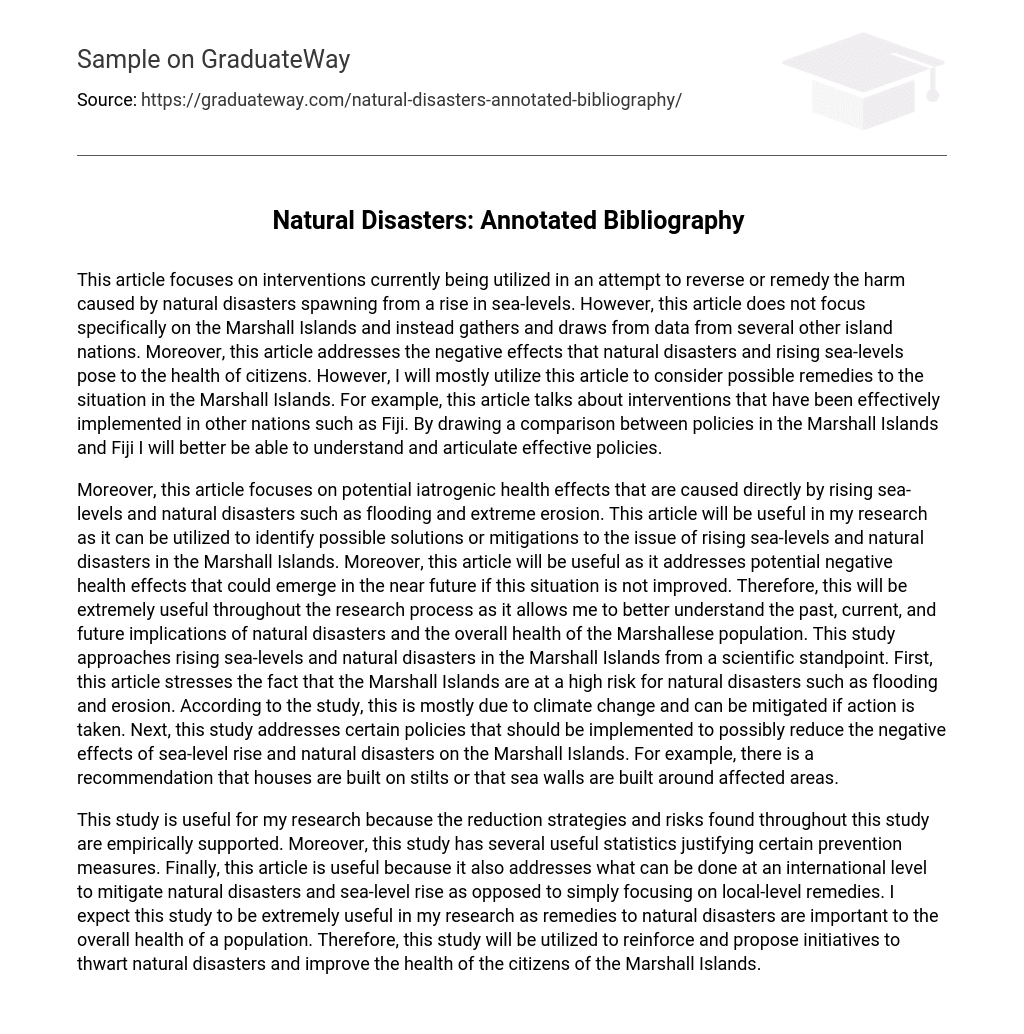This article focuses on interventions currently being utilized in an attempt to reverse or remedy the harm caused by natural disasters spawning from a rise in sea-levels. However, this article does not focus specifically on the Marshall Islands and instead gathers and draws from data from several other island nations. Moreover, this article addresses the negative effects that natural disasters and rising sea-levels pose to the health of citizens. However, I will mostly utilize this article to consider possible remedies to the situation in the Marshall Islands. For example, this article talks about interventions that have been effectively implemented in other nations such as Fiji. By drawing a comparison between policies in the Marshall Islands and Fiji I will better be able to understand and articulate effective policies.
Moreover, this article focuses on potential iatrogenic health effects that are caused directly by rising sea-levels and natural disasters such as flooding and extreme erosion. This article will be useful in my research as it can be utilized to identify possible solutions or mitigations to the issue of rising sea-levels and natural disasters in the Marshall Islands. Moreover, this article will be useful as it addresses potential negative health effects that could emerge in the near future if this situation is not improved. Therefore, this will be extremely useful throughout the research process as it allows me to better understand the past, current, and future implications of natural disasters and the overall health of the Marshallese population. This study approaches rising sea-levels and natural disasters in the Marshall Islands from a scientific standpoint. First, this article stresses the fact that the Marshall Islands are at a high risk for natural disasters such as flooding and erosion. According to the study, this is mostly due to climate change and can be mitigated if action is taken. Next, this study addresses certain policies that should be implemented to possibly reduce the negative effects of sea-level rise and natural disasters on the Marshall Islands. For example, there is a recommendation that houses are built on stilts or that sea walls are built around affected areas.
This study is useful for my research because the reduction strategies and risks found throughout this study are empirically supported. Moreover, this study has several useful statistics justifying certain prevention measures. Finally, this article is useful because it also addresses what can be done at an international level to mitigate natural disasters and sea-level rise as opposed to simply focusing on local-level remedies. I expect this study to be extremely useful in my research as remedies to natural disasters are important to the overall health of a population. Therefore, this study will be utilized to reinforce and propose initiatives to thwart natural disasters and improve the health of the citizens of the Marshall Islands. This article focuses specifically on the fifty two nations in the world known as SIDS. SIDS are described as small island nations that are still in the midst of development. More specifically, this article takes a deeper look at how climate change, natural disasters, and other risk factors affect the people of these nations. However, this article will be especially useful because it directly addresses the intersectionality of rising sea-levels, natural disasters, and negative health effects. Moreover, this article will be useful because it talks directly about ways that these nations have attempted to improve their situation through the use of disaster warnings. Therefore, I will use this article to justify and explain effective approaches to the mitigation of natural disasters.
In addition, this article is extremely useful in my research because there is an exhaustive list of case studies of islands affected directly by disasters. This allows a comparison to be drawn between the Marshall Islands and other nations allowing me to see possible approaches or solutions to the issues found in the Marshall Islands. Finally, this article addresses how natural disasters can have a negative effect on the mental health of a population. This is an interesting angle and will be useful as a point for my group to discuss as mental health is integral to the overall health of society and global health in general. Overall, this article gives a holistic view of how natural disasters harm the citizens of small island nations.





